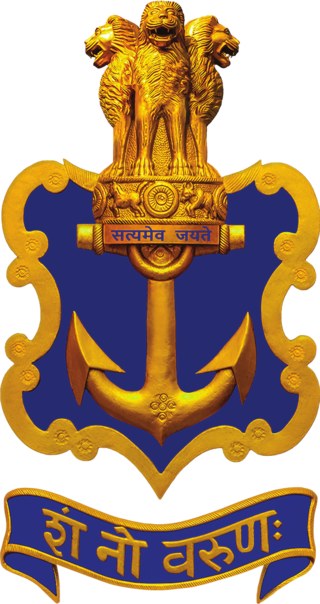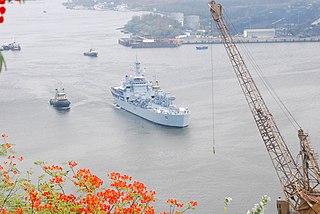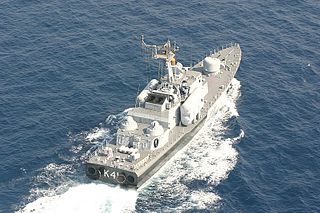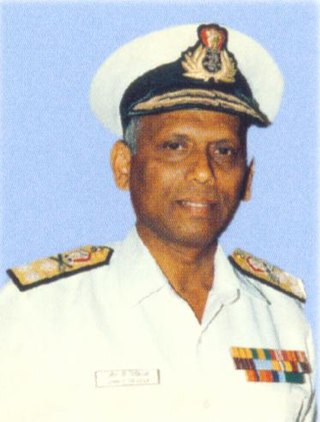
The Indian Navy is the maritime branch of the Indian Armed Forces. The President of India is the Supreme Commander of the Indian Navy. The Chief of Naval Staff, a four-star admiral, commands the navy. As a blue-water navy, it operates significantly in the Persian Gulf Region, the Horn of Africa, the Strait of Malacca, and routinely conducts anti-piracy operations and partners with other navies in the region. It also conducts routine two to three month-long deployments in the South and East China seas as well as in the western Mediterranean sea simultaneously.

INS Delhi was a Leander-class light cruiser built for the Royal Navy in 1933 as HMS Achilles, and commissioned into the New Zealand Division of the Royal Navy in 1937 as HMNZS Achilles. She was returned to the Royal Navy at the end of the Second World War and in 1948 was sold to the Royal Indian Navy to be recommissioned as HMIS Delhi. In 1950 she was renamed INS Delhi and remained in service until decommissioned at Bombay on 30 June 1978.

INS Rana is a Rajput-class destroyer in active service with the Indian Navy. She was commissioned on 28 June 1982.

Operation Trident was an offensive operation launched by the Indian Navy on Pakistan's port city of Karachi during the Indo-Pakistani War of 1971. Operation Trident saw the first use of anti-ship missiles in combat in the region. The operation was conducted on the night of 4–5 December and inflicted heavy damage on Pakistani vessels and facilities. While India suffered no losses, Pakistan lost a minesweeper, a destroyer, a cargo vessel carrying ammunition, and fuel storage tanks in Karachi. Another destroyer was also badly damaged and eventually scrapped. India celebrates its Navy Day annually on 4 December to mark this operation. Trident was followed up by Operation Python three days later.

INS Jalashwa is an amphibious transport dock currently in service with the Indian Navy. Formerly USS Trenton, she, along with six Sikorsky SH-3 Sea King helicopters were procured from the United States by India for a total of US$90 million in 2005. She was commissioned on 22 June 2007. INS Jalashwa is the only Indian naval ship to be acquired from the United States. She is based in Visakhapatnam under the Eastern Naval Command.

Admiral Sardarilal Mathradas "Charles" Nanda, PVSM, AVSM was an Indian Navy admiral who served as the 6th Chief of the Naval Staff from 1 March 1970 until 28 February 1973. He led the Indian Navy during the Indo-Pakistani War of 1971 and successfully executed a naval blockade of both West and East Pakistan, helping India achieve an overwhelming victory during the war. For the important role he played in the war, the Government of India awarded him the Padma Vibhushan, India's second-highest civilian award. Nanda is recognised as one of the most notable commanders in the history of the Indian Navy.

INS Airavat (L24) is the third Shardul-class tank landing ship of the Indian Navy.

The Andaman and Nicobar Command (ANC) is a integrated tri-services command of the Indian Armed Forces, based at Port Blair in the Andaman and Nicobar Islands, a Union Territory of India. It was created in 2001 to safeguard India's strategic interests in Southeast Asia and the Strait of Malacca by increasing rapid deployment of military assets in the region. It provides logistical and administrative support to naval ships which are sent on deployment to East Asia and the Pacific Ocean.

The Veer-class corvettes of the Indian Navy are a customised Indian variant of the Soviet Tarantul class. They form the 22nd Missile Vessel Squadron.

INS Kulish is a Kora-class corvette, currently in active service with the Indian Navy. She was ordered in October 1994, and the keel was laid in October 1995. The ship was launched in August 1997 and was commissioned on 20 August 2001.
The Indo-Pakistani Naval War of 1971 refers to the maritime military engagements between the Indian Navy and the Pakistan Navy during the Indo-Pakistani War of 1971. The series of naval operations began with the Indian Navy's exertion of pressure on Pakistan from the Indian Ocean, while the Indian Army and Indian Air Force moved in to choke Pakistani forces operating in East Pakistan on land. Indian naval operations comprised naval interdiction, air defence, ground support, and logistics missions.

Vice Admiral Nilakanta Krishnan, PVSM, DSC, was a former flag officer in the Indian Navy. He was the Flag Officer Commanding-in-Chief Eastern Naval Command during the 1971 Indo-Pakistani War.

INS Shakti (A57) is a Deepak-class fleet tanker in service with the Indian Navy. She was built by Fincantieri, an Italian shipbuilding company based in Trieste. She is the second and final ship of her class. Shakti, along with her predecessor Deepak, is one of the largest ships of the Indian Navy.

INS Jyoti (A58) is the third of four Komandarm Fedko-class replenishment oilers. She was modified for naval use and is now being operated by the Eastern Naval Command of the Indian Navy. Jyoti was the largest ship in the navy until INS Vikramaditya (R33) was commissioned in November 2013. It is the third largest ship in the Indian Navy after the aircraft carriers INS Vikrant and INS Vikramaditya. Its primary role is fleet replenishment and sustaining blue-water operations. It was later fitted with close-in weapon systems for self-defence.

Admiral Radhakrishnan Hari Kumar is retired flag officer in the Indian Navy. He served as 25th Chief of the Naval Staff (CNS). Previously, he served as the Flag Officer Commanding-in-Chief, Western Naval Command. In his prior appointments, he served as the Chief of Integrated Defence Staff, Chief of Personnel, Controller Personnel Services, the Flag Officer Commanding Western Fleet, Flag Officer Sea Training and the Chief of the Staff of the Western Naval Command. He was the Commandant of the Naval War College, Goa and served as a naval advisor to the government of Seychelles. He is an alumnus of National Defence Academy, the Naval War College, the Army War College, Mhow and the Royal College of Defence Studies.

Vice Admiral Sree Harilal Sarma, PVSM was an Indian Navy admiral who served as Flag Officer Commanding Eastern Fleet (FOCEF) during the Indo-Pakistani War of 1971. He later served as the Flag Officer Commanding-in-Chief Eastern Naval Command from 1 March 1977 to 2 February 1978.
Vice Admiral Elenjikal Chandy Kuruvila, PVSM, AVSM was a former Flag officer in the Indian Navy. He was the Fleet commander of the Western Fleet during the Indo-Pakistani War of 1971, for which he was awarded the Param Vishisht Seva Medal. He later led the Southern Naval Area and then served as the chairman and managing director of Mazagon Dock Limited.

Vice Admiral John Colin De Silva, PVSM, AVSM was a flag officer in the Indian Navy. He last served as the Vice Chief of the Naval Staff (VCNS) from 2001 to 2002. He also served as the 11th Director General of the Indian Coast Guard, which he led from 1999 to 2001. He was the commissioning commanding officer of the Rajput-class guided-missile destroyer INS Ranvijay (D55). After retiring from the Navy, he served as Chairman of the Executive Committee of the Overseas Employment Agency, an agency set up by the Government of Goa.
Rear Admiral Arun Auditto, AVSM, NM was a Flag Officer in the Indian Navy. He was decorated with a gallantry award during the Liberation of Goa. A pioneer submariner in the Indian Navy, he was the commissioning Commanding Officer of the Kalvari-class submarine INS Kursura (S20), which he commanded during the Indo-Pakistani War of 1971. He later commanded the submarine base INS Virbahu and the Whitby-class frigate INS Trishul (F143). After promotion to flag rank, he served as the Fortress Commander, Andaman and Nicobar Islands (FORTAN) and as the first Flag Officer Submarines, before retiring in 1988.

Vice Admiral Sameer Saxena, AVSM, NM is a serving Flag officer in the Indian Navy. He currently serves as the Chief of Staff, Eastern Naval Command. He earlier served as the Flag Officer Commanding Gujarat Naval Area, as the Flag Officer Commanding Western Fleet and as the Naval adviser to the High Commissioner of India to the United Kingdom at India House, London.
















